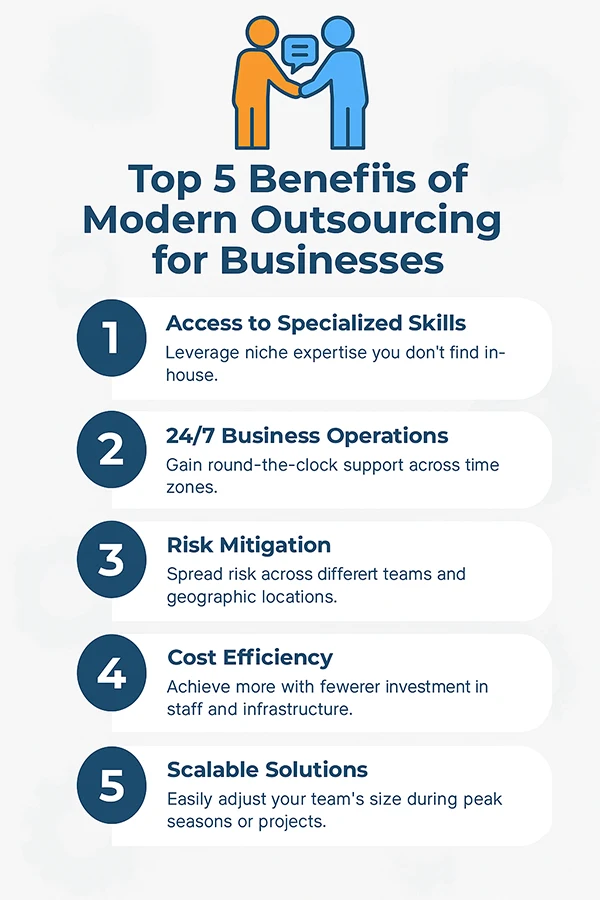Outsourcing has now shifted to important strategic growth, innovation, and collaborative/shared partnerships, rather than merely saving employment expenses or cost savings.
KEY TAKEAWAYS
- Outsourcing now supports innovation, agility, and strategic business growth.
- AI, RPA, and cloud tech are transforming outsourcing operations globally.
- Modern outsourcing emphasizes collaboration over a transactional vendor relationship.
- Business readiness depends on clear processes, KPIs, and flexible culture.
Do you know about outsourcing? According to Wikipedia, “Outsourcing is a business practice in which companies use external providers to carry out business processes that would otherwise be handled internally.”
It can greatly benefit any business if it’s done right. Outsourcing to Romania, for example, has been gaining quite a lot of popularity these days. But not all companies are ready for outsourcing, so how to determine if yours is?
In this article, I’ll mention is your business is ready for the new era of outsourcing. Let’s get started.
What’s Changing in Outsourcing Today
In some ways, outsourcing is no longer exclusive to avoiding high employment costs. Outsourcing has evolved as a go-to strategic partner option for innovation and capabilities. Businesses are looking for capabilities, not just cheaper pricing or costs. Businesses want quicker delivery and speedier agility.
Remote work technologies, cloud platforms, and globalization of the workforce mean small firms can access international resources and partners. The client-vendor relationships, which have traditionally been viewed linearly across time and scale, are shifting toward collaborative processes, cultivating and transforming new organizations shaped by forward-looking insights.
These insights are integrated into trajectory mapping over time rather than a transactional mindset. Regulatory responsibilities and data privacy laws are also driving some of these changes in outsourcing. Below, you can see the five major benefits of modern outsourcing.

Key Technologies Driving the New Outsourcing Wave
Outsourcing is changing with technology! These technologies provide better ways of outsourcing the work of rudimentary, repetitive tasks that outsourcing companies provide for clients (gathering information) with machine learning, AI, Cloud Computing, and RPA.
As evidenced, machines will perform the redundant activities that manual outsourcing has done historically and will perform these tasks with even fewer errors and more accurate judgment. With the Cloud, we can connect and collaborate in real-time with people halfway around the world.
Robotic Process Automation (RPA) is changing the redundant back office opportunities for clients with its automation potential and streamlining these processes.
What Modern Outsourcing Means for Your Business
Modern outsourcing is no longer about offloading work; it is about developing capabilities. Many of today’s outsourcing partners have advanced tools, skilled expertise, and strategic insight. Instead of an alternative to save costs, outsourcing is a growth driver.
Businesses are able to ramp up quickly, adjust with the market, and be innovative, all without adding bloated overhead. Outsourcing also allows businesses to concentrate on competent functions while specialists handle all functions, such as IT specialists, customer support, or marketing.
Contracts today are more flexible and performance-based, which gives you greater control and information. Modern outsourcing is about developing a capable business that is agile, competitive, and future-ready while maintaining quality.
Signs Your Business Is (or Isn’t) Ready to Outsource Smartly
If your internal team is overcrowded, individual projects are lagging or failing, or expertise gaps are severely inhibiting growth for your business, outsourcing might be your next best strategic decision. You are showing signs of readiness when you have documented processes, measurable KPIs, and your organization’s culture encourages external collaboration.
Investigating IT capabilities in places such as the Eastern European IT landscape provides access to skilled people at quality prices. Conversely, if your work is chaotic, there’s little delegation, and you have no cohesive communication tools, you may find it difficult to add external collaborators to your project.
Readiness is also influenced by your budgetary flexibility, data and IT systems management, and how you can go about vetting a reliable partner.
Steps to Future-Proof Your Outsourcing Strategy
To ensure your outsourcing initiatives are future-proof, you will want to ensure that your outsourcing capabilities align with your long-term business objectives. You will want to choose partners that concentrate on innovating, scaling and culture building, and not just on price.
You will want to create flexible contracts with performance-based incentive metrics.
Invest in collaboration tools and infrastructure for cybersecurity to enable you to appropriately integrate outsourced vendors remotely into your business workflows.
Furthermore, you will want to educate and train your internal team to be able to govern and manage the remote vendor on an ongoing basis after the initial engagement is established. Continuously review legislative and data compliance in the geographies that you have outsourced business process areas.
Conclusion
Outsourcing is no longer simply a way to save costs; it is now a means to enable strategic growth. Organizations can now access a global pool of talent as well as expertise through new technologies such as AI, cloud computing, and RPA, creating a revolution in the outsourcing landscape.
Today’s modern outsourcing requires businesses to have the willingness to use resources strategically, the ability to adapt, and a real commitment to a quality relationship. By aligning outsourcing to a longer-term focus, engaging in developing long-lasting relationships with vendors.
By implementing new technology and investing in internal capacity, organizations can remain competitive in the rapidly changing future of work.



